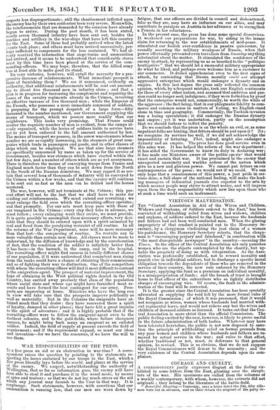WAR RESPONSIBILITIES OF THE PRESS.
Is a free press an aid or an obstruction in war-time? A corre- spondent raises the question by pointing to the statements re- specting the losses sustained by our troops in the East, which a free press literally lays before the world, and places at the service of the enemy. We suspect, notwithstanding the authority of Wellington, that so far as information goes, the enemy will have been able to steal it and purchase it in the usual mode, by means of spies and traitors ; so that we do not lay much stress on the aid which any journal may furnish to the Czar in that way. It is surplusage. Such statements, however, with assertions that our ammunition is running low, that our men are worn down by
false as they are, may have an influence on our allies, and may contribute to paralyze an Austria in her advances or to strengthen a Prussia in her reluctances.
In the present case, the press has done some special disservices. It weakened our preparations for war, by aiding in the insane claim for returning to the war establishments of mid-peace. It stimulated our foolish over-confidence in passive quiescence, by roundly asserting the military weakness of Russia, when that power effectually prevented even travellers from knowing anything substantial about the matter. It stimulated the confidence of the enemy in attack, by representing us as so besotted to the " politique boutiqniere " that we should let a successful military appropriator do what he liked, and perhaps even welcome him as a customer to our commerce. It dulled apprehension even to the first signs of attack, by contending that Russia morally could not attempt aggressive enterprises which would endanger a dynasty and an empire. In this last dogma the press only reflected the common opinion, which, by a frequent mistake, took our English sentiments for those of every other nation, and assumed that ambition and pas- sion could no longer seek indulgence, if they were forbidden by proof that the enterprise would not, commercially, be worth the while of the aggressor ; the fact being, that in our phlegmatic fidelity to com- merce and common sense in matters of feeling, we English stand alone in time and geography. Commercially, the Turkish invasion was a losing speculation ; it did endanger the Russian dynasty and empire ; yet it was undertaken, partly on the assumption that we should forbear to inflict the penalty.
Do we conclude that the press is on the whole an evil, or, as some impatient folks are hinting, that fetters should be put upon it ? No ; we recognize its services too well, if we did not acknowledge the impossibility of fettering. That, indeed, might also endanger a dynasty and an empire. The press has done good service even in this same war. It has helped the reform of the war department ; it has aided the Government to know its duty in declaring war; it has made our Ministers aware of the public opilio, that would exact and sustain that war. It has proclaimed to the enemy that unexpected unanimity and warlike ardour of the nation which give us a new and glorious power. We cannot put fetters on our contemporaries of the press ; we would not if we could. We can only hope that a consciousness of this power, a just pride in ser- vices done, a full share of the national feeling, will make the lead- ing managers of influential journals rise superior to the arts by which meaner people may strive to attract notice, and will impress upon them the deep responsibility which now lies upon those who at such a time wield such an instrument.


































 Previous page
Previous page